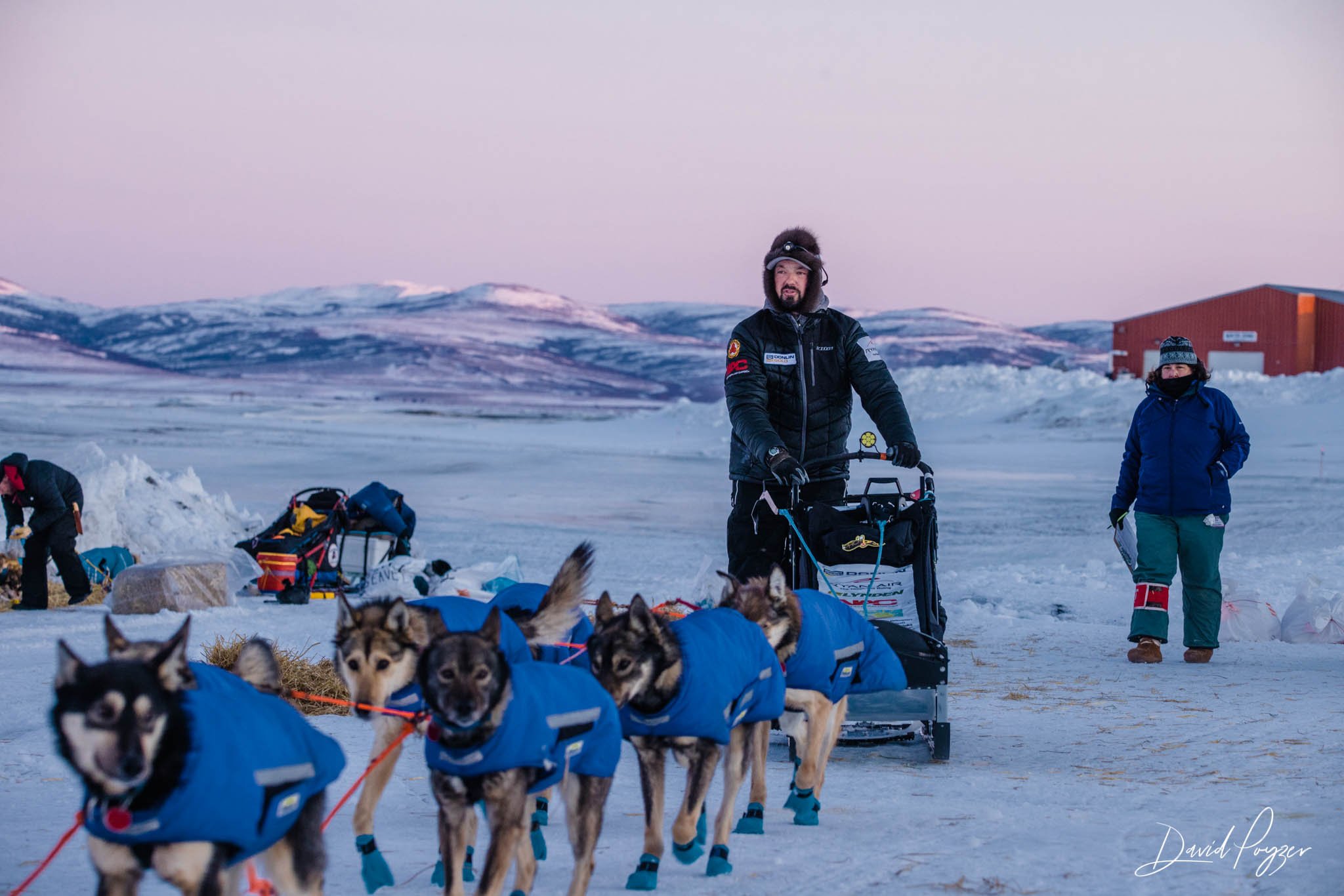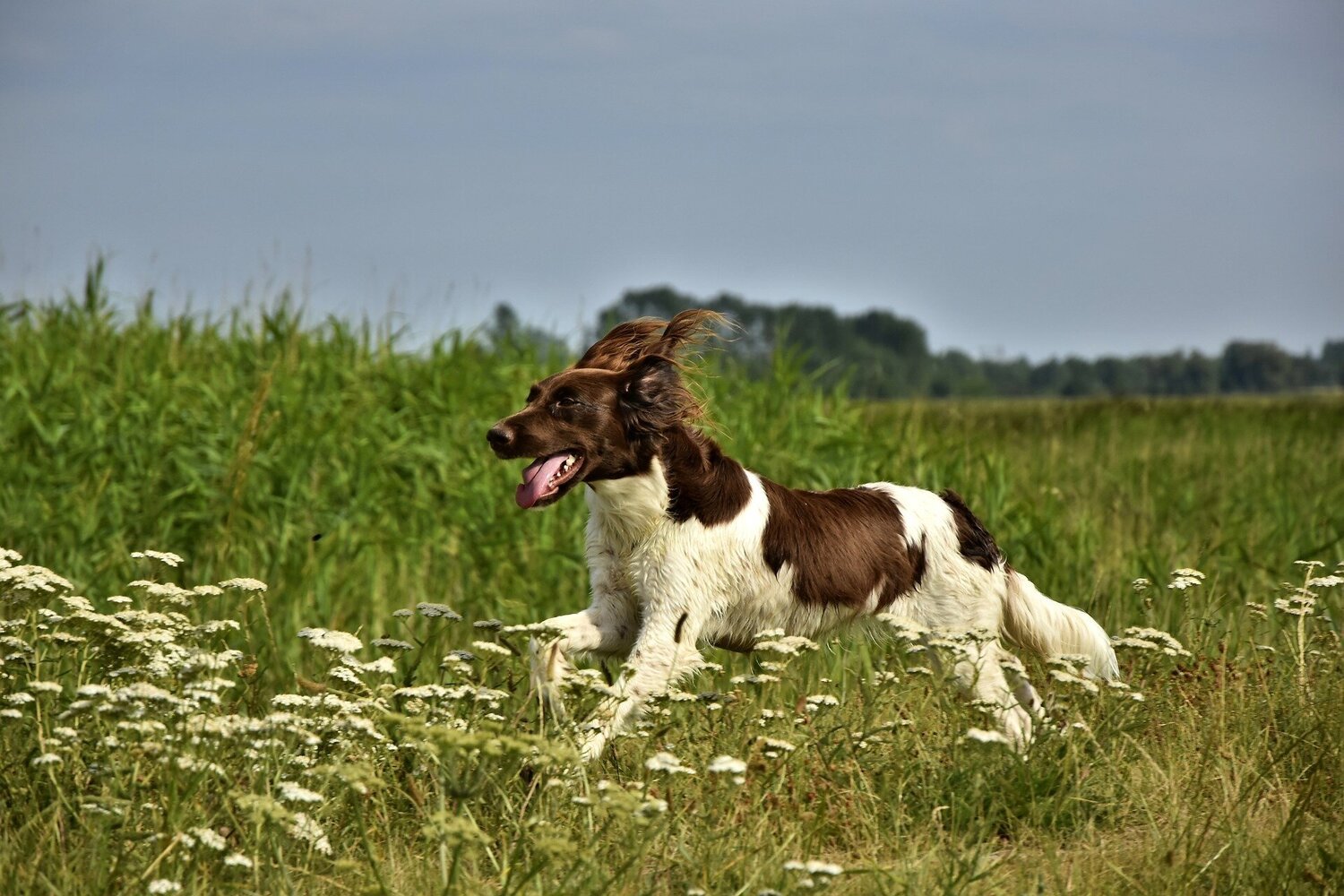A New Battle Begins
The mushers have to relive their own nightmares on the way back over the trail's most demanding sections between Nikolai and Finger Lake.
The Dreaded Dalzell Gorge
Dalzell Gorge is one section of the trail where broken sleds and broken dreams are not uncommon. The word «gorge» means “a narrow valley between hills or mountains, typically with steep rocky walls and a stream running through it.”
Christian Turner wrote about this section of the trail after running it with his team in 2014:
“The chutes were vertical drops that I bashed and bounced my way down ..smashing into trees and rocks as I terrifyingly tried to stay upright and in control. I can remember Dallas’s words clearly before the race, ”Once you pass it you do not have to do it again” …crash bounce slide crunch …. I thought to myself.. I don’t think I will be able to do it again.”

Aaron Burmeister is one of the mushers currently battling for his first ever Iditarod title. Photo: Dave Poyzer
But this year they have to. The mushers also need to go back past the Burn with sand and rocks and no snow and the Happy River Steps, and there's nothing happy about them. This trail, between Finger Lake and Rainy Pass checkpoints, is a very narrow trail that zigzags back and forth downhill toward the Happy River.
A New Battle
It gives the mushers a mental boost to turn around and run back towards the finish line. At the same time, they know that they are only halfway. It's an eternity left, it feels like at this stage of the race. This is the hour when the battle on the trail is intensified. And another battle is also occurring; the fight against yourself.
When the sleep deficit has built up over several days and the body is battered and tired, it is easy to find excuses. With extreme cold on the way back to Ophir, there were probably many mushers who felt how long the minutes can be when you stand on the sled in the dark of night and fight against yourself.
Negative Thoughts
Many mushers experience doubt during these hours. There may be problems with the team, unforeseen obstacles, but often it is your mind that tries to trick you into giving up. It is a survival mechanism; when you reach a certain point of exhaustion, the mind responds with shut down.
In terms of evolution, it makes sense. We are not evolutionarily designed to win races, but to survive. When our mind thinks we are in danger, it will do what it can to secure us, with thoughts of all the reasons in the world why we should give up and stop.
Am I Able To Do This?
This is when the mushers have to distance themselves from their own thoughts and let the negative pass by. It's about following routine, not thinking too much, one foot in front of the other, one step at a time and never looking back.

Dallas Seavey packing his sled as fast as he can to be able to fight for the victory. Photo: Dave Poyzer
If you loosen the grip at this point of the race, you can lose everything. If you treat yourself an hour of extra sleep, it can cost you a lot of placements.
“This is where the race starts getting run.”
The mushers who manage to be tough with themselves, who follow the plan even when they are exhausted, will emerge victorious from the demanding second half of the competition – and not only in terms of placements, but also in terms of mastery. For the next few hours come with an internal question for many; am I able to do this?
It is when you push yourself out of your comfort zone and you have to find your way through an unknown mental landscape, that growth and change can occur.
It is this inner journey, which tests you to the utmost, that makes these long races something more than just a dog race. It's a lifetime lived in a week. It is life itself.
LET THE REAL RACE BEGIN!
Tuesday, March 1st 2022, Ryan Anderson and his dogs crossed the finish-line first in Grand Portage, making him the John Beargrease Sled Dogs champion.
Redingtons bold move backfired - he’s out of the race!
We can finally say it once again - QRILL PAWS 2022 IS READY TO ROLL! That’s despite another difficult year for race organizers and everyone involved in sled dog events.
Aker BioMarine, the Norwegian biotech company behind QRILL PAWS, launches QPaws - The Dog Activity App to help track and improve the health of active dogs across the globe.
We think knowing the basics in nutrition is important for anyone. That’s why we decided to write a series of articles on basic dog nutrition. First topic up - water and energy sources.
Summer is here, and it’s time for long, relaxing walks in the nature with your furry little friend. Unfortunately, it’s also time for ticks to start crawling around in the bushes. Take your precautions to make sure that the bug doesn’t ruin your summer!
The name “canicross” is a combination of the words “canine” and “cross-country”, which is actually a great description of the sport. Canicross is simply cross-country running with your dog!
Over the past weeks, Norway’s Toughest Dog has been crowned amongst the dogs who were signed up for Femundløpet 2021. Furry rocket Ronja took the title home, together with a ton of dog food for herself and her kennel. With the amount of requests and questions about a competition for all dog owner, we weren’t in doubt - #mintøffing2021 became a reality!
After three years, Dallas Seavey is returning to the Iditarod, after the 2017 helter skelter incident that shocked his life and mushing career.
The mushers have to relive their own nightmares on the way back over the trail's most demanding sections between Nikolai and Finger Lake.
After three years, Dallas Seavey is returning to the Iditarod, after the 2017 helter skelter incident that shocked his life and mushing career.
At age 10 she harnessed her border collie Bear and a goat to pull hay to the horses. Now, for the 19th time, Jessie Royer (44) has harnessed her 16 most competitive dogs to win Iditarod.
Growing up with sailing and surrounded by golden beaches on the East Coast, Susannah Tuminelli has travelled a long way, when she now starts on the trail.
In March last year, Iditarod mushers were chased down the trail by a pandemic. Now, 12 months later, the world is still in the midst of the disease.
The Swiss born Martin Buser (62) lines up for his 38th Iditarod race this year. The Wayne Gretzky of dog sledding, has been inducted into the Alaska Sports Hall of Fame.
In the aftermath of cancelling this year’s edition of Femundløpet, organisers and sponsors put together the alternative online competition – Norway’s Toughest Dog. And what a support from the community!
Even though this year’s race had to be cancelled due to Covid-19 restrictions, there will be winners. And the prize is no less than 1000 kg dog food. The famous Norwegian dog trainer Maren T. Rørvik leads the jury.
As a fantastic way of thanking the everlasting effort from the organisers of Beargrease 2021, the mushers put on the most thrilling final sprint in the history of the race. In the end, only 7 seconds separated 1st and 2nd.































